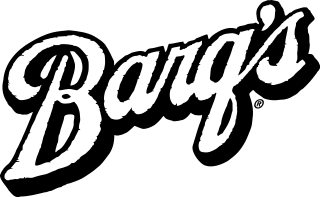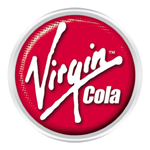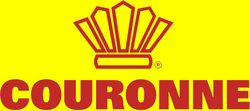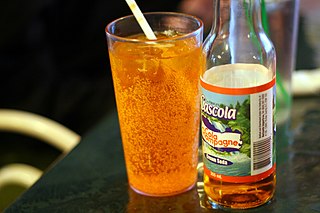
Coca-Cola, or Coke, is a cola soft drink manufactured by the Coca-Cola Company. In 2013, Coke products were sold in over 200 countries and territories worldwide, with consumers drinking more than 1.8 billion company beverage servings each day. Coca-Cola ranked No. 94 in the 2024 Fortune 500 list of the largest United States corporations by revenue. Based on Interbrand's "best global brand" study of 2023, Coca-Cola was the world's sixth most valuable brand.

Cola is a carbonated soft drink flavored with vanilla, cinnamon, citrus oils, and other flavorings. Cola became popular worldwide after the American pharmacist John Stith Pemberton invented Coca-Cola, a trademarked brand, in 1886, which was imitated by other manufacturers. Most colas originally contained caffeine from the kola nut, leading to the drink's name, though other sources of caffeine are generally used in modern formulations. The Pemberton cola drink also contained a coca plant extract. His non-alcoholic recipe was inspired by the coca wine of pharmacist Angelo Mariani, created in 1863.

Julmust is a soft drink that is mainly consumed in Sweden around Christmas. During Easter, the name is påskmust. During the rest of the year, it is sometimes sold under the name must. The content is the same regardless of the marketing name, and the drink is most closely associated with Christmas. 45 million litres of julmust are consumed during December, which is around 50% of the total soft drink volume in December and 75% of the total yearly must sales. Must was created by Harry Roberts and his father Robert Roberts in 1910 as a non-alcoholic alternative to beer.

Barq's is an American brand of root beer created by Edward Barq and bottled since the beginning of the 20th century. It is owned by the Coca-Cola Company. It was known as "Barq's Famous Olde Tyme Root Beer" until 2012. Some of its formulations contain caffeine.

Diet or light beverages are generally sugar-free, artificially sweetened beverages with few or no calories. They are marketed for diabetics and other people who want to reduce their sugar and/or caloric intake.

Surge is a citrus-flavored soft drink first produced in the 1990s by the Coca-Cola Company to compete with Pepsi's Mountain Dew. Surge was advertised as having a more "hardcore" edge, much like Mountain Dew's advertising at the time, in an attempt to lure customers away from Pepsi. It was originally launched in Norway as Urge in 1996, and was so popular that it was released in the United States as Surge in 1997. Lagging sales caused production to be ended in 2003 for most markets.

Virgin Cola was a carbonated cola soft drink, launched in 1994. In 2009, it was discontinued in the United Kingdom, and in 2014 it was stopped being made by its final licensee, in Bangladesh.

The Coca-Cola Company is an American multinational corporation founded in 1892. It manufactures, sells and markets soft drinks including Coca-Cola, other non-alcoholic beverage concentrates and syrups, and alcoholic beverages. Its stock is listed on the New York Stock Exchange and is a component of the DJIA and the S&P 500 and S&P 100 indexes.

Orange soft drinks are carbonated orange drinks.

Guaraná Antarctica is a guaraná-flavoured soft drink, originating in Brazil. It was created in 1921 by Pedro Baptista de Andrade for Companhia Antarctica Paulista. The drink is produced in five countries: Portugal, Brazil, Argentina, Bolivia and Japan.
Benzene in soft drinks is of potential concern due to the carcinogenic nature of the molecule. This contamination is a public health concern and has caused significant outcry among environmental and health advocates. Benzene levels are regulated in drinking water nationally and internationally, and in bottled water in the United States, but only informally in soft drinks. The benzene forms from decarboxylation of the preservative benzoic acid in the presence of ascorbic acid and metal ions that act as catalysts, especially under heat and light. Hot peppers naturally contain vitamin C so the observation about soft drinks applies to pepper sauces containing sodium benzoate, like Texas Pete.

Cherry cola, a distinctive soft drink blend of cherry-flavored syrup and cola, traces its roots to the United States, where it gained prominence in the realm of soda beverages. The origins of this concoction can be situated within the nostalgic ambiance of old-fashioned soda fountains, where it has been consumed by consumers for years.

Sunkist is a brand of primarily orange-flavored soft drinks that launched in 1979. Sunkist primarily competes with The Coca-Cola Company's Fanta brand and Keurig Dr Pepper's Orange Crush brand.

Pepsi-Cola Soda Shop Made with Real Sugar, originally named Pepsi Throwback and Pepsi Made with Real Sugar and still branded that way in some international markets, is a soft drink sold by PepsiCo. The drink is flavored with cane sugar and beet sugar instead of the sugar substitute high-fructose corn syrup that has been used in the standard version of Pepsi within North America since the 1980s.

In the United States, Mexican Coca-Cola, or Mexican Coke or, informally, "Mexicoke", refers to Coca-Cola produced in and imported from Mexico. The Mexican formula that is exported into the U.S. is sweetened with white sugar instead of the high-fructose corn syrup used in the American formula since the early 1980s. Some tasters have said that Mexican Coca-Cola tastes better, while other blind tasting tests reported no perceptible differences in flavor.

Coca-Cola Life was a reduced-calorie version of Coca-Cola introduced in 2013, using a combination of stevia and sugar as sweeteners. It was first released in Argentina and Chile after five years of research together in these countries. The formulation varied by market location, and in some areas the original formulation had been phased out in favor of a zero-calorie version sweetened with stevia only. The drink was discontinued in 2020 as part of the Coca-Cola Company discontinuing underperforming brands.

Brasserie de la Couronne, S.A., is a carbonated soft drink manufacturer and the licensed bottler for the Coca-Cola Company in Haiti. It makes the popular Cola Couronne Fruit Champagne and recently added Diète Couronne Fruit Champagne, Couronne Limonade, and Diète Couronne Limonade. It bottles Coca-Cola, Sprite, Fanta, and Gladiator for the Coca-Cola Company.

Champagne cola, Kola Champagne, or Champagne soda is a sweetened carbonated beverage produced mainly in the tropics of Latin America, former British West Indies, and Pakistan. Kola Champagne was invented in Puerto Rico by Ángel Rivero Méndez. Rivero Méndez was a Captain in the Spanish Army during the Spanish–American War. In 1902, a few years after the end of the Spanish-American War, Rivero Méndez founded El Polo Norte Fábrica de Sodas where he created the Kola Champagne, which became, and still is, a popular soft drink in Puerto Rico. While elaborating the drink he worked on his book, Chronicle of the Spanish-American War in Puerto Rico.

















